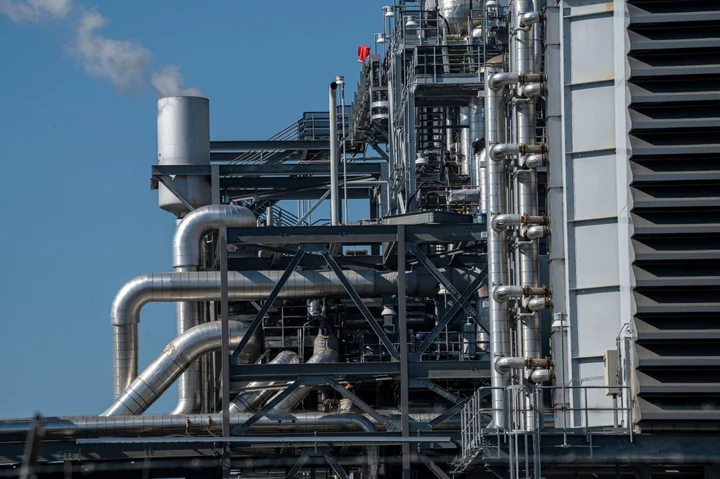A group of electric utilities and producers is throwing its support behind the Biden administration’s plan for throttling greenhouse emissions from the nation’s coal and gas power plants.
The Energy Strategy Coalition, whose members include National Grid USA, NextEra Energy Inc. and Pacific Gas and Electric Co., argues the Environmental Protection Agency is on solid legal footing tying proposed requirements to carbon-capture technology and cleaner-burning hydrogen.
The stance, outlined in formal comments filed with the government and not previously reported, puts the group at odds with some of the nation’s largest investor-owned utilities. Their top trade group, the Edison Electric Institute, criticized core elements of the EPA proposal earlier this week, arguing the agency overestimates the readiness of the technologies that would be compelled by many of the nation’s gas power plants.
Read More: Power-Plant Owners Blast Biden’s Emissions Curbs as Unproven
The EPA proposal would require many large, frequently run gas-fired power units to replace 30% of their fuel with cleaner-burning hydrogen by 2032 or install carbon-capture systems by 2035.
Both options can fulfill the Clean Air Act’s legal requirement for “adequately demonstrated” emission-cutting technology as long as there’s enough lead time for deployment, the Energy Strategy Coalition said. “And both can be cost-effective,” the group adds, especially given funding from last year’s climate and infrastructure laws, including more than $10 billion in investment in carbon management, capture and transport technology, as well as a supercharged tax credit for trapping the gas.
The coalition — whose members do overlap with the EEI — argues that the Clean Air Act is meant to force the adoption of new and better technology, and courts have upheld an array of previous EPA standards based on equipment that wasn’t yet widely deployed or honed.
The group, whose roster also includes Calpine Corp., Constellation Energy Corp. and the New York Power Authority, emphasizes one concern with what it calls the “burgeoning” carbon-capture and storage ecosystem: Where to put all of the captured gas.
Dozens of applications are pending before the EPA for underground wells to store carbon dioxide, part of a growing backlog at the agency. Permitting those storage wells and other CO2 infrastructure is critical to fulfilling the agency’s proposed requirements, the coalition argues.
To build out carbon-storage capacity in the EPA’s time frame, the agency “must expeditiously review and approve” carbon-storage wells, the coalition warns. The agency must dedicate funding and other resources to fast-track storage well approvals, to ensure carbon capture can “truly be deployed at scale.”
Author: Jennifer A. Dlouhy

